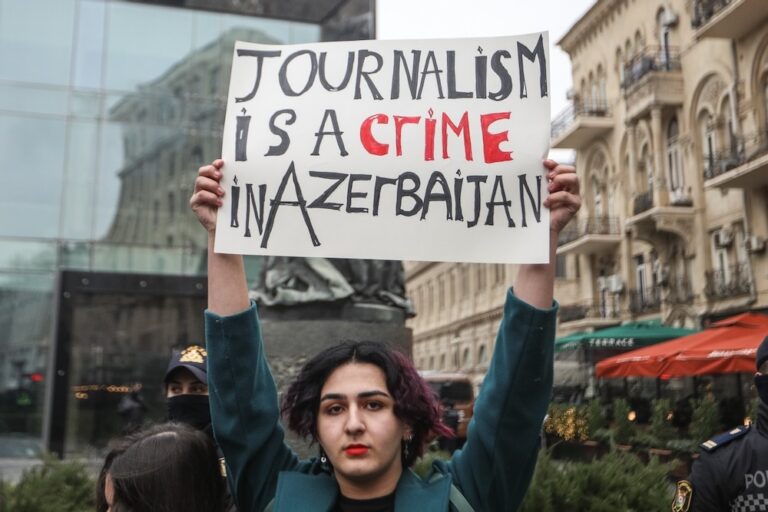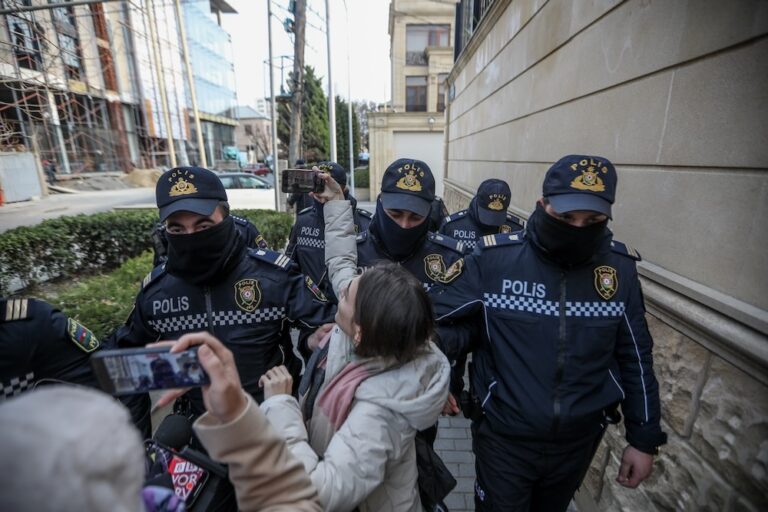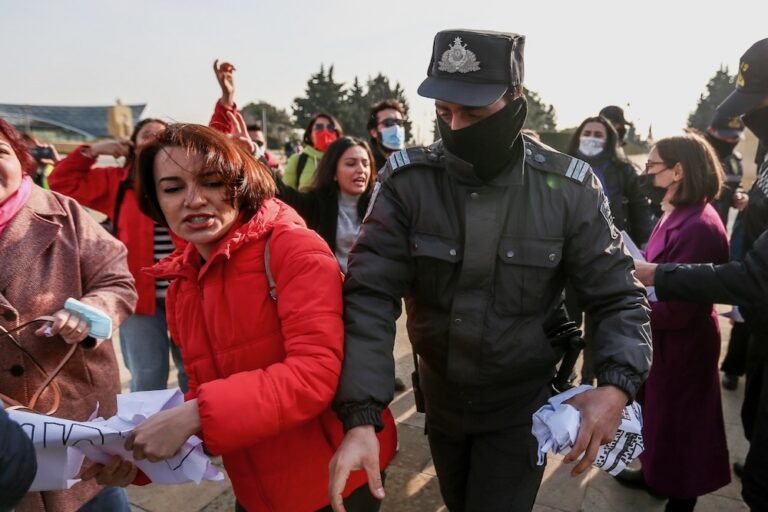The International Partnership Group for Azerbaijan, along with local NGOs, condemn the persecution of nine journalists, protesters and human rights defenders for exercising their right to freedom of expression and information in Azerbaijan in recent weeks.
The International Partnership Group for Azerbaijan (IPGA), along with local NGOs Institute for Reporters’ Freedom and Safety, Human Rights Club and Media Rights Institute condemn the persecution of nine journalists, protesters and human rights defenders for exercising their right to freedom of expression and information in Azerbaijan in recent weeks.
March 2013 has so far proved to be a damning month for freedom of expression in Azerbaijan, showing the high personal cost and sacrifice those who exercise their right to speak freely on matters of public interest, provide alternative opinions or criticise the authorities in Azerbaijan today have to make.
As the country gears up for the presidential elections in October 2013 there has been a significant rise in civil mobilisation in recent months. This includes protests on a range of issues from corruption to physical abuse in the military, which have resulted in mass arrests and huge fines, levied as a result of amendments to the Law on Freedom of Assembly introduced in November 2012.
“With the world closely watching the rapidly widening crackdown on dissent in Azerbaijan, we would like to express our strong concerns and serious doubts with regard to the Government of Azerbaijan’s intentions to implement their obligations before international organisations. We are seriously concerned that if the Azerbaijani government does not immediately lift all restrictions on freedom of expression, freedom of assembly and association, free and fair presidential elections in October this year will not be possible,” states Emin Huseynov, Chairman and CEO for the Baku-based press freedom watchdog, the Institute for Reporters’ Freedom and Safety (IRFS).
Key developments and concerns in March 2013, regarding the treatment of journalists, protesters and human rights defenders as well as civil society organisations:
Journalists
*On Tuesday 12 March, independent journalist and editor-in-chief of Xural newspaper, Avaz Zeynalli was sentenced to nine years in prison on charges of extortion, tax evasion and failure to implement a court decision. His sentencing came after a long-drawn out trial during which no evidence substantiating the charges was presented to the court. Zeynalli has been in detention since his arrest in October 2011, based on claims made by former MP, Gular Ahmadova, that the editor had attempted to blackmail her. Ahmadova was herself taken into custody on 13 February 2013 charged with involvement in a corruption scam. Xural, and Zeynalli himself, were known to be critical of the authorities. A week before his arrest Zeynalli had written an article which accused the President of Azerbaijan, Ilham Aliyev, of not being interested in the national independence of the country. Two days later a court sanctioned the confiscation of the newspaper Xural’s property, and the paper was later sold without Zeynalli’s prior knowledge.
*On Friday 15 March, Vugar Gonagov and Zaur Guliyev, executive director and editor-in-chief of Khayal TV respectively, were released after they were given a probationary sentence of three years having been convicted of “organising public disorder” and “abuse of office”. Gonagov and Guliyev had been behind bars since their arrest in March 2012, accused of provoking the mass riots that broke out two weeks earlier on 1 March. They allegedly posted online a video of regional governor, Rauf Habibov making derogatory remarks about local people. Thousands of protesters, including opposition and youth activists, demonstrated in Guba on 1 March 2012 demanding Governor Habibov’s resignation, as a result of his comments.
*No progress has been made in finding the masterminds behind the smear campaign against independent investigative journalist Khadija Ismayilova carried out one year ago. On 14 March 2012, one week after Ismayilova publically announced that she would not give in to a blackmail attempt, an illegally obtained and intimate video of the journalist was posted online. Ismayilova had carried out a number of investigations into the businesses of the presidential family, exposing cases of high-level corruption and disclosing information about the offshore businesses of members of the Aliyev family.
*Saturday 2 March marked the eighth anniversary of the murder of Elmar Huseynov, editor-in-chief of Monitor newspaper. Huseynov, a known critic of the Azerbaijani authorities, was fatally gunned down in his apartment building in a well-organised attack in 2005. Since his murder, there have been dozens of violent attacks against journalists in Azerbaijan, including the murder of prominent journalist and writer Rafig Tagi in November 2011. No one has been brought to justice for either of these murders creating a climate of impunity for those who wish to use violence to silence critical voices.
Aside from Zeynalli, six other journalists remain in prison on politically-motivated charges: journalists Faramaz Novruzoglu and Fuad Huseynov, Tolishy Sado newspaper chief editor Hilal Mammadov, Yeni Musavat newspaper journalist Tofig Yagublu, azadxeber.org website editor Nijat Aliyev and xeber44.com website editor Araz Guliyev.
Protesters and opposition activists
*On 14 March, Rashad Hasanov, a youth activist with the opposition citizen’s movement NİDA, was arrested on charges of possessing illegal weapons and faces up to eight years in prison if found guilty. On 18 March his lawyer, Asabali Mustafayev, reported having been denied access to his client following his arrest. Hasanov was arrested along with Ruslan Asad, an employee of the National Democratic Institute (NDI), who was later released. The NIDA Movement describes itself as an organisation that campaigns for democratic reforms, a free civil society, and social and economic reforms. Several of its members have faced harassment and arrest (see below).
*Hasanov’s arrest came days after three other activists of NİDA – Shahin Novruzlu, Bakhtiyar Guliyev and Mammad Azizov were detained on 6 March on similar charges. Investigators stated that they had found drugs and “Molotov cocktails” in their apartments, an allegation refuted by the activists’ families who claim that these items had been planted. Their arrests came ahead of a demonstration announced by NIDA for 10 March to protest against the deaths and alleged abuse of military conscripts.
Also on 14 March, a prominent critic of the regime, leader of REAL political movement Ilgar Mammadov had his prison term extended to two months. A potential presidential candidate, Mammadov was arrested on 4 February 2013 on charges of orchestrating the mass protests that took place in the town of Ismayilli in January. More than 50 Azerbaijani civil society organisations believe Mammadov’s arrest to be politically motivated.
*On 8 March, Mahir Bayramli a member of the opposition party Musavat was sentenced to five days detention in Ganca, Azerbaijan’s second largest city. The charges are unknown as Bayramli was sentenced in a closed trial.
NGOs and Human Rights Defenders
*On 11 March, Azerbaijan’s President Ilham Aliyev signed into law amendments to the Law on Non-Governmental Organisations, which could negatively impact upon the right to freedom of association, assembly and expression through introducing excessive restrictions on the activities of civil society organisations. The law requires local groups, IRFS among them, to inform authorities about any funding or donations of above 200 manat (about US$250), and demands that they sign a formal contract with donors. The failure to meet these requirements would lead to exorbitant fines and confiscation of property.
*10 March 2013 marked the third anniversary of the closure of the Azerbaijan Human Rights House, having been forced to suspend its activities until a required agreement with the Azerbaijani authorities was approved. The Azerbaijan Human Rights House is one of the members of Human Rights House Network and, until its closure in 2010, its office served as an independent meeting place for human rights organisations.
*On 6 March, Human Rights Club, released a statement illustrating how they had been targeted by the Azerbaijani authorities, particularly in relation to their campaign ART for Democracy, which was launched in December 2012. The campaign was harshly criticised in articles published by ruling party newspapers which labeled ART for Democracy as “anti-national” and intended to “sabotage” Azerbaijan. On 19 February, the authorities in Azerbaijan turned down an application by the Human Rights Club to officially register as an NGO. The organisation has battled for more than two years for registration.
* On the same day it was revealed that ART for Democracy’s Advocacy Director, the American-British human rights campaigner Rebecca Vincent had had her residency permit revoked by the authorities without an official explanation. Rebecca, who worked for ARTICLE 19 as the IPGA coordinator until September 2012, has been active on human rights in Azerbaijan for several years but is no longer allowed to enter the country.
On 18 March a photography exhibition entitled “Work for human rights in Azerbaijan” was shut down just half an hour after opening. The exhibition was organised by the Society of Women for Regional Development and Azerbaijan Human Rights House. The closure of the exhibit follows a wave of systematic harassment of independent NGOs, in which they were either denied the space to organize their events or simply kicked out from the arranged venue.
*On 15 March, in an interview with AzerTac News Agency the Head of the Presidential Administration Ramiz Mehdiyev made a statement in which he accused foreign NGOs of engaging in activities outside their mandate and interfering in the “internal affairs” of Azerbaijan. The statement, and cases highlighted above, shows the Azerbaijani authorities’ attitude towards both local and international NGOs critical of the government.
The IPGA along with IRFS, Human Rights Club and Media Rights Institute, denounce the way Azerbaijani authorities target individuals that are peacefully exercising their right to freedom of expression and the overall repression of civil society in the country.
The IPGA, along with IRFS, Human Rights Club and Media Rights Institute, call upon the Azerbaijani authorities to:
*Immediately and unconditionally release all persons in detention or imprisoned in connection with exercising their right to freedom of expression, including Avaz Zeynalli, Faramaz Novruzoglu, Fuad Huseynov, Hilal Mammadov, Tofig Yagublu, Nijat Aliyev and Araz Guliyev.
*Immediately and unconditionally release Ilgar Mammadov.
*Immediately release Rashad Hasanov, Shahin Novruzlu, Bakhtiyar Guliyev and Mammad Azizov and ensure their access to lawyers
Overturn on appeal the convictions of Vugar Gonagov and Zaur Guliyev.
*Ensure an independent investigation into the smear campaign and blackmail attempt against Khadija Ismayilova and bring the masterminds to justice.
*Effectively investigate the murders of Elmar Huseynov and Rafig Tagi in line with international standards and bring the perpetrators and masterminds of their murders to justice.
*Investigate and prosecute all cases of violence or harassment against journalists, bringing the perpetrators and masterminds of such attacks to justice.
*Overturn legislation restricting the right to freedom of expression, including amendments to NGO legislation and to the law on freedom of assembly adopted in November 2012.
*Respect the rights to freedom of expression, association and peaceful assembly, both online and offline, and refrain from targeting human rights defenders, journalists and others who peacefully express opinions critical of the authorities.
In April 2013, Azerbaijan’s human rights record will be assessed as part of its second UN Universal Periodic Review (UPR). During its first review in 2009 the Azerbaijani government accepted various recommendations linked to freedom of expression, none of which have been implemented. Rather than improving, the human rights situation in Azerbaijan has continued to deteriorate significantly since 2009 and the current state of freedom of expression in the country is alarming.
The IPGA, along with IRFS, Human Rights Club and Media Rights Institute, believe it is the responsibility of the international community to ensure this review process holds Azerbaijan to account over its human rights record. We call upon UN states to provide recommendations on the following key freedom of expression issues, which continue to be violated in Azerbaijan:
*Failure to protect the right to life of journalists
*Impunity for violence against journalists
*Violations of the right to private life
*Politically motivated arrests and imprisonment
*Cruel, inhuman or degrading treatment
*Legislative restrictions on freedom of expression
*Restrictions on freedom of expression online
*State control of the media
The IPGA and local organisations, including IRFS, Human Rights Club and Media Rights Institute, prepared a submission to the UN as part of the UPR process, which can be accessed here.
Signed by,
Human Rights Club
Human Rights House Foundation
International Media Support
Institute for War and Peace Reporting
Open Society Foundations
Media Diversity Institute
Media Rights Institute


